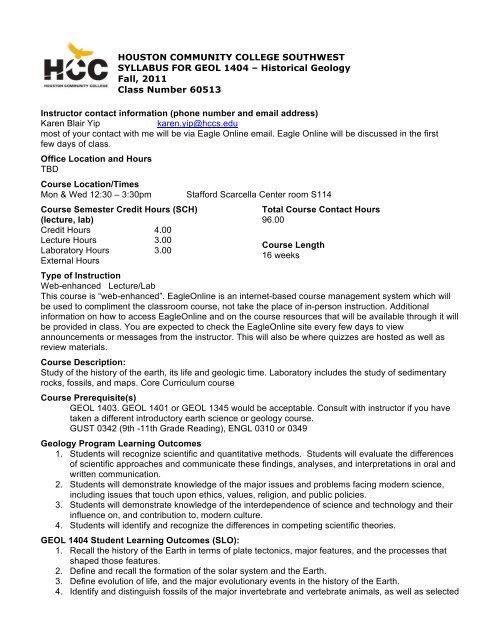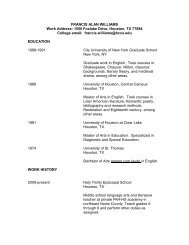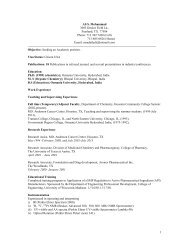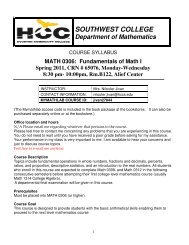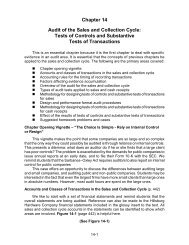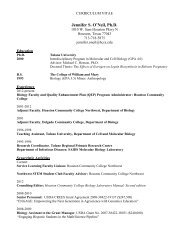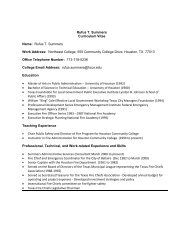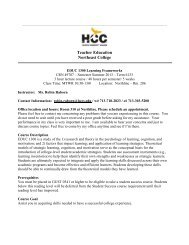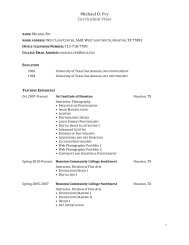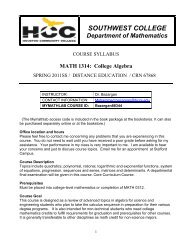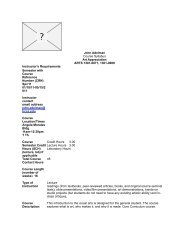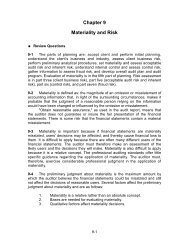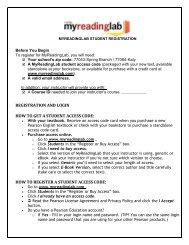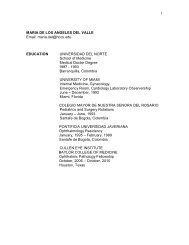HOUSTON COMMUNITY COLLEGE SOUTHWEST SYLLABUS FOR ...
HOUSTON COMMUNITY COLLEGE SOUTHWEST SYLLABUS FOR ...
HOUSTON COMMUNITY COLLEGE SOUTHWEST SYLLABUS FOR ...
Create successful ePaper yourself
Turn your PDF publications into a flip-book with our unique Google optimized e-Paper software.
plant fossils.5. Analyze, identify, and remember sedimentary rocks in terms of physical properties, textures,compositions, sedimentary structures, and environments of deposition.6. Recall and apply the principles of sedimentology.GEOL 1404 Learning Objectives1.1. Name the eons, eras and periods of the geologic time scale including the dates of the eras.1.2. Visualize the supercontinents of the past and previous locations of North America.1.3. Identify the major tectonic features of present day North America.1.4. Identify the Alpine-Himalayan orogenic belt and the East African Rift System.3.1. Organize fossil samples into phyla.4.1. Draw the fossil, visualize the animal or plant, and describe how and where it lived.4.2. Compare the symmetry and physical characteristics of the different phyla and classes of the fossils.5.1. Construction of charts to organize and contrast sedimentary rock samples according to theirproperties, textures, compositions, sedimentary structures, environments of deposition, and tectonicsettings.6.1. Read, interpret and analyze paleogeographic maps and geologic cross sections.6.2. Synthesize geologic history by organizing events in chronologic order.6.3. Visualize the physical landscape represented by paleogeographic maps, geologic cross sections, andfossils.SCANS and/or Core Curriculum Competencies: If applicablePerspectives - 2. Stimulate a capacity to discuss and reflect upon individual, political, economic, and socialaspects of life in order to understand ways in which to be a responsible member of society;Perspectives - 5. Develop personal values for ethical behavior;Perspectives - 6. Develop the ability to make aesthetic judgments;Perspectives - 7. Use logical reasoning in problem solving;Perspectives - 8. Integrate knowledge and understand the interrelationships of the scholarly disciplines.Perspectives - 1. Establish broad and multiple perspectives on the individual in relation to the largersociety and world in which he or she lives, and to understand the responsibilities of living in a culturallyand ethnically diversified world;COURSE CALENDARWEEK DATE LECTURES, LABS & ASSESSMENTSweek 1 8/29 Introductions, Overview of Course and Chapter 1 The Science of Historical Geology8/31 Chapter 2 & 3: Early Geologists Tackle History’s Mysteries and Time and Geologyweek 2 9/5 LABOR DAY HOLIDAY9/7 Chapter 4: Rocks and Minerals and introduce sedimentary rocks (start lab 1?)week 3week 49/12 Chapter 5: The Sedimentary Archives9/14 Lab #1: Exercise 1 & 2 sedimentary rocks & textural clues in sed. rocks9/19 Continue Chapter 5: The Sedimentary Archives9/21 Lab #2: Exercise 4 Ancient Sedimentary Environmentsweek 5 9/26 Exam 1 (chap 1-5) Chapter 6: Life on Earth9/28 Lab #3: Exercise 5 Tectonic Settingsweek 610/3 Chapter 7: Plate Tectonics10/5 Lab Exam #1 Lab #4: Exercise 6 Sea-floor spreading and Plate Tectonicsweek 710/10 Chapter 7 continued (start chap 8 if done early)Geology 1404: Historical Geology: Fall 2011 SyllabusUpdated: 8/29/112
10/12 Lab #5: Exercise 7 – Age Relations and Unconformityweek 810/17 Chapter 8: The Archean Eon and Chapter 9: The Proterozoic10/19 Lab #6: Exercise 8 Rock Units and Time-Rock Unitsweek 9 10/24 Exam 2 (chap 6, 7, 8, 9)10/26 Lab #7: Exercise 14 Geologic Maps and structuresweek 10week 11week 12week 13week 14week 1510/31 Chapter 10 and 11: The Early Paleozoic and Late Paleozoic11/2 Lab #8: Exercise 9 The advance and retreat of Ancient ShorelinesWithdrawal deadline – 4:30PM, Thurs, Nov 311/7 Chapter 12: Life of the Paleozoic11/9 Lab #9: Exercise 10 & 11 -- Fossils 1 &211/14 Chapter 13: Mesozoic Events11/16 Lab #10: Exercise 12 Fossil Indicators of Age, Environment, and correlation11/21 Chapter 14: Life of the Mesozoic11/23 Lab #11: Exercise 1311/28 Chapter 15: Cenozoic Events11/30 LAB EXAM #212/5 Chapter 16: Life of the Cenozoic and Chapter 17 Human Origins12/7 Last Class Meeting Open Topics and Review for Final ExamFINALS Wed Final Exam noon Wed Dec, 14 Do not miss the final exam. It is cumulative and12/14 comprehensive.NOTE: Course Syllabus and Class Schedule subject to modification. Any updates to the syllabus andschedule will be posted LearningWeb and EagleOnline.This semester the Course Calendar may be altered after ~ Week 8 as I will be having a baby sometime inlate October/early November. When the department chairman has selected a substitute, I will let you knowwho that is. The substitute may choose to assign different lab assignments and alter the schedule oflectures. They will let you know via a new semester calendar. The Final Exam time and date will notchange as this is set by HCC.Instructional MethodsWeb-enhanced. EagleOnline is available at https://hccs1.mrooms3.net/login/index.php.Student AssignmentsAssignments in this course will be ~weekly Lab assignments. Most of these assignments will be directlyfrom the lab book. You will usually work in pairs to complete the assignment and both of you will put yournames on it to submit. Thus, you and your partner will receive the same grade. You may work with anyonein the class and you do not need to keep the same lab partner each week. I encourage you to work withdifferent people. Some of the lab assignments need materials available only in the lab classroom and youmay not be able to finish them after the lab period. For this reason it is important that you make the mostof the hours you have in lab so you can finish the assignments for full possible credit.Student Assessment(s)Quizzes: There will be quizzes throughout the semester. The quizzes will be administered on-line via theclass EagleOnline site. The quizzes will be available for a certain number of days. Once the deadline isGeology 1404: Historical Geology: Fall 2011 SyllabusUpdated: 8/29/113
past you will not be able to take the quiz. See the grading criteria below for the weight of the quizzes inyour final score. I may also choose to give unannounced in-class quizzes, so always be prepared.Examinations: Lecture exams will consist of a variety of question types including multiple choice, fill-in,short answer, image labeling and sketching. Prior to the exam I will let you know about any materials youwill need (ie: calculator, colored pencils, rulers, etc). Exam dates are indicated on the course calendarlisted earlier in this syllabus.Lab exams will also be given covering some of the skills practiced in lab exercises. Lab tests will generallyinclude "hands on" testing such as fossil identification or map interpretation. You will be expected tomemorize the Geologic Time Scale for the first lab test.See the grading criteria below for the weight of the semester’s exams in your final score.Instructor's RequirementsLab Requirements: Lab attendance is mandatory. Lab exercises and assignments are designed tocomplement the lecture and give you hands-on experience with the concepts covered in lecture. Thinkingthrough and understanding lab assignments are a big step toward learning the material. Collaborativegroup work is emphasized. You can learn from your classmates and them from you.Missed Examinations: As a rule, no make-up exams will be given and a grade of 0 will be earned if anexam is missed. Should an exam be missed due to an exceptional situation beyond the student’s control,the situation will be assessed on a case-by-case basis but the instructor should be notified of the situationas soon as possible. Ideally, students should contact the instructor prior to missing a scheduledexamination in-person or by e-mail.Cell Phone Policy: Cell phones are important to many of us for communication. However, in theclassroom they are distractions. Your job in class is to learn and participate as much as possible. Cellphones and pagers and similar devices should be turned to silent (as in NO NOISE AT ALL) while you arein class. If you need to take/make an emergency call you may talk in the hallway. If you are texting orotherwise fiddling with your device during class you will be asked to put it away. If your phone habitsbecome a nuisance to the classroom you will be asked to leave.Tardiness: Arriving to class late is disruptive. If this happens once or twice it may be overlooked if youcome in quietly. But if you are frequently late to class it is a problem and you can expect me to start aconversation with you about how to solve the problem. Additional tardies may necessitate counselorinvolvement.HCC Grading ScaleA = 100- 904 points per semester hourB = 89 - 80:3 points per semester hourC = 79 - 70:2 points per semester hourD = 69 - 60:1 point per semester hour59 and below = F 0 points per semester hourIP (In Progress) 0 points per semester hourW(Withdrawn)0 points per semester hourI (Incomplete)0 points per semester hourAUD (Audit)0 points per semester hourIP (In Progress) is given only in certain developmental courses. The student must re-enroll to receive credit. COM(Completed) is given in non-credit and continuing education courses. To compute grade point average (GPA), dividethe total grade points by the total number of semester hours attempted. The grades "IP," "COM" and "I" do not affectGPA.If you cease attending class and do not complete the withdraw process you will receive your earned grade at the endof the semester – this will likely be an F.Geology 1404: Historical Geology: Fall 2011 SyllabusUpdated: 8/29/114
attendance, course participation, and opportunities for tutoring or other assistance that might beavailable.Student with Disabilities (ADA): HCCS is committed to compliance with the American with DisabilitiesAct and the Rehabilitation Act of 1973 (section 504)"Any student with a documented disability (e.g. physical, learning, psychiatric, vision, hearing,etc.) who needs to arrange reasonable accommodations must contact the Disability ServicesOffice at the respective college at the beginning of each semester. Faculty is authorized toprovide only the accommodations requested by the Disability Support Services Office.For questions, contact Donna Price at 713.718.5165 or the Disability Counselor at your college.To visit the ADA Web site, log on to www.hccs.edu, click Future Students, scroll down the pageand click on the words Disability Information.”If you have any special needs or disabilities, which may affect your ability to succeed in college classesor participate in college programs/activities, please contact the office of disability support services at thecollege. Upon consultation and documentation, you will be provided with reasonable accommodationsand/or modifications. Please contact the DSS office as soon as you begin the term. Dr. Becky A. Hauri at713 718 7909. Also visit the ADA web site at: http://www.hccs.edu/hccs/future-students/disabilityservices.Policy on Recording Devices: Use of recording devices (camera phones, cameras, audio/taperecorders, video recorders, and any other electronic device that is capable of recording the human voiceor image) is prohibited in classrooms, laboratories, faculty offices, and other locations where instruction,tutoring, or testing occurs. Students with disabilities who need to use a recording device as a reasonableaccommodation should contact the Office for Students with Disabilities for information regardingreasonable accommodations.HCC Sexual Harassment Policy: HCC shall provide an educational, employment, and businessenvironment free of sexual harassment. Sexual harassment is a form of sex discrimination that is nottolerated at HCC. Any student who feels that he or she is the victim of sexual harassment has the right toseek redress of the grievance. HCC provides procedures for reviewing and resolving such complaintsthrough its Grievance Policy. Substantiated accusations may result in disciplinary action against theoffender, up to and including termination of the employee or suspension of the student. In addition,complainants who make accusations of sexual harassment in bad faith may be subject to equivalentdisciplinary action.Academic Honesty: “Students are responsible for conducting themselves with honor and integrity infulfilling course requirements. Disciplinary proceedings may be initiated by the college system against astudent accused of scholastic dishonesty. Penalties can include a grade of "0" or "F" on the particularassignment, failure in the course, academic probation, or even dismissal from the college. Scholasticdishonesty includes, but is not limited to, cheating on a test, plagiarism, and collusion.” Cheatingincludes looking at or copying from another student's exam, orally communicating or receiving answersduring an exam, having another person take an exam or complete a project or assignment, usingunauthorized notes, texts, or other materials for an exam, and obtaining or distributing an unauthorizedcopy of an exam or any part of an exam. Plagiarism means passing off as his/her own the ideas orwritings of another (that is, without giving proper credit by documenting sources). Plagiarism includessubmitting a paper, report or project that someone else has prepared, in whole or in part. Collusion isinappropriately collaborating on assignments designed to be completed independently. These definitionsare not exhaustive. When there is clear evidence of cheating, plagiarism, collusion or misrepresentation,a faculty member will take disciplinary action including but not limited to: requiring the student to retakeor resubmit an exam or assignment, assigning a grade of zero or "F" for an exam or an assignment; orassigning a grade of "F" for the course. Additional sanctions, including being withdrawn from thecourse/program or expelled from school, may be imposed on a student who violates the standards ofacademic integrity. See the Student handbook for additional details.Access Student Services Policies on their Web site:Geology 1404: Historical Geology: Fall 2011 SyllabusUpdated: 8/29/116
http://hccs.edu/student-rightsAnd also check out the HCC Student Handbook: http://www.hccs.edu/hccs/current-students/studenthandbookEGLS3 -- Evaluation for Greater Learning Student Survey SystemAt Houston Community College, professors believe that thoughtful student feedback is necessary toimprove teaching and learning. During a designated time near the end of the term, you will be asked toanswer a short online survey of research-based questions related to instruction. The anonymous resultsof the survey will be made available to your professors and department chairs for continual improvementof instruction. Look for the survey as part of the Houston Community College Student System online nearthe end of the term.Geology 1404: Historical Geology: Fall 2011 SyllabusUpdated: 8/29/117


